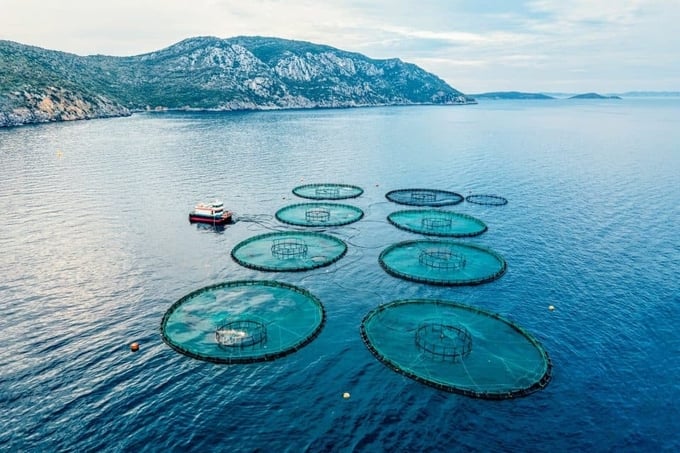May 15, 2025 | 09:22 GMT +7
May 15, 2025 | 09:22 GMT +7
Hotline: 0913.378.918
May 15, 2025 | 09:22 GMT +7
Hotline: 0913.378.918

Unlike traditional wild fisheries that depend on capturing fish from natural bodies of water, aquaculture involves cultivating these species in tanks, ponds, or ocean enclosures.
A recent report by the United Nations Food and Agriculture Organization (FAO) highlights this shift and underscores the growing importance of sustainable aquaculture in meeting the world’s food needs.
Aquaculture, often referred to as fish farming, is the practice of breeding, rearing, and harvesting aquatic organisms like fish and seaweed in controlled environments.
Unlike traditional wild fisheries that depend on capturing fish from natural bodies of water, aquaculture involves cultivating these species in tanks, ponds, or ocean enclosures.
This method allows for greater control over growing conditions, such as water quality, feed, and breeding cycles, which can lead to more efficient and sustainable production.
Aquaculture plays a crucial role in supplementing wild fish stocks, reducing pressure on overfished populations, and contributing to global food security. It also supports livelihoods in coastal and rural areas by providing jobs and economic opportunities.
By producing high-quality protein with lower environmental impact compared to some land-based farming practices, aquaculture presents a promising solution to meet the increasing global demand for nutritious and sustainable seafood.
In 2022, aquaculture reached a significant milestone by producing 94.4 million tons of aquatic animals. This impressive output accounted for 51 percent of the total aquatic production globally.
Even more noteworthy is that 57 percent of this production was specifically intended for human consumption. This achievement underscores the growing importance of aquaculture in meeting the world’s food needs.
The increase in aquaculture production is crucial as the global demand for aquatic foods continues to rise. As populations grow and dietary preferences shift towards healthier and more diverse options, the need for reliable sources of aquatic foods becomes more pressing.
The FAO highlights the importance of sustainable production practices in aquaculture. Ensuring that aquaculture operations are environmentally friendly and resource-efficient is vital for maintaining the health of our ecosystems.
“Aquatic systems are increasingly recognized as vital for food and nutrition security,” the report states. This sentiment was echoed by experts who recently gathered in Costa Rica to discuss ocean conservation.
Due to their diversity and capacity to provide ecosystem services, aquatic food systems offer a promising solution to enhance global food security and nutrition.
Despite the steady production levels of wild fisheries over the past decades, aquaculture has seen a 6.6 percent increase since 2020. However, the sustainability of wild fishery resources remains a significant concern.
The proportion of marine stocks fished within biologically sustainable levels dropped to 62.3 percent in 2021, down from 64.6 percent in 2019. The report calls for urgent action to accelerate the conservation and rebuilding of fishery stocks.
With the global population projected to reach 8.5 billion by 2030, significant investments are necessary to ensure adequate food, nutrition, and livelihoods. The report highlights the potential of aquaculture, particularly in Africa, where it remains largely untapped.
Currently, over 40 percent of the global population cannot afford a healthy diet, making the role of aquaculture even more critical. Aquatic products are among the most traded food commodities, generating a record $195 billion in 2022 – a 19 percent increase from pre-pandemic levels.
Despite these achievements, the sector faces significant challenges, including climate change, water scarcity, pollution, and biodiversity loss.
The report’s release coincides with a meeting in San Jose, Costa Rica, where country representatives, scientists, and international experts are preparing for the third UN Ocean Conference in France in 2025.
United Nations Under-Secretary-General for Social Affairs, Li Junhua, emphasized the urgency of protecting the ocean, stating that it is “not an option but an imperative.”
Costa Rica’s President Rodrigo Chaves, hosting the two-day meeting, warned that failing to act would jeopardize the future of humanity. Participants are debating critical issues, including the ocean’s capacity to absorb carbon dioxide, the need for sustainable fishing practices, and tackling marine pollution.
In conclusion, the shift from wild fisheries to aquaculture marks a pivotal moment in global food security. Sustainable aquaculture offers a viable solution to meet the growing demand for aquatic foods, but it requires significant investment and concerted global efforts to overcome the challenges posed by climate change and other environmental threats.
(Earth.com)

(VAN) Fourth most important food crop in peril as Latin America and Caribbean suffer from slow-onset climate disaster.

(VAN) Shifting market dynamics and the noise around new legislation has propelled Trouw Nutrition’s research around early life nutrition in poultry. Today, it continues to be a key area of research.

(VAN) India is concerned about its food security and the livelihoods of its farmers if more US food imports are allowed.

(VAN) FAO's Director-General emphasises the need to work together to transform agrifood systems.

(VAN) Europe is facing its worst outbreak of foot-and-mouth since the start of the century.

(VAN) The central authorities, in early April, released a 10-year plan for rural vitalization.

(VAN) Viterra marked a significant milestone in its carbon measurement program in Argentina, called Ígaris, reaching 1 million soybean hectares measured.